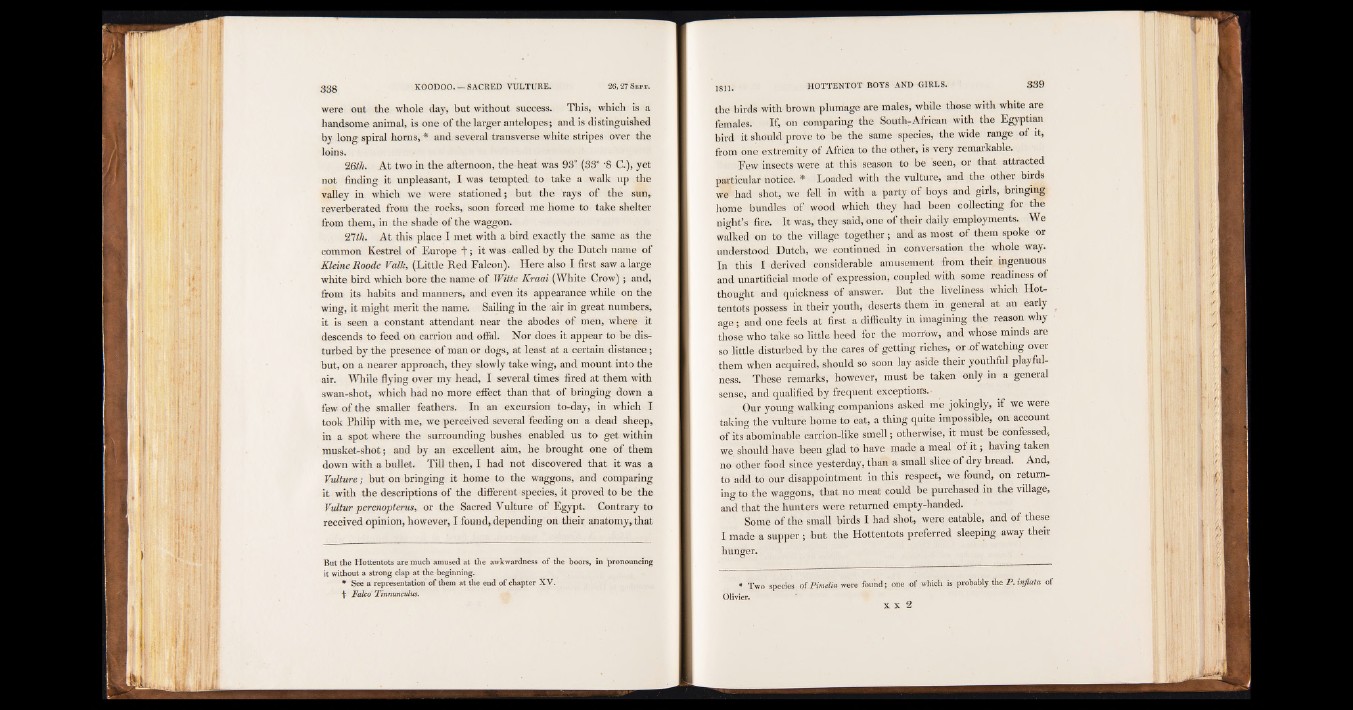
were out the whole day, but without success. This, which is a
handsome animal, is one of the larger antelopes; and is distinguished
by long spiral horns, * and several transverse white stripes over the
loins.
9.6th. At two in the afternoon, the heat was 93° (33° -8 C.), yet
not finding it unpleasant, I was tempted to take a walk up the
valley in which we were stationed; but the rays of the sun,
reverberated from the rocks, soon forced me home to take shelter
from them, in the shade of the waggon.
97th. At this place I met with a bird exactly the same as the
common Kestrel of Europe f ; it was called by the Dutch name of
Kleine Roode Valle, (Little Red Falcon). Here also I first saw a large
white bird which bore the name of Witte Kraai (White Crow); and,
from its habits and manners, and even its appearance while on the
wing, it might merit the name. Sailing in the air in great numbers,
it is seen a constant attendant near the abodes of men, where it
descends to feed on carrion and offal. Nor does it appear to be disturbed
by the presence of man or dogs, at least at a certain distance;
but, on a nearer approach, they slowly take wing, and mount into the
air. While flying over my head, I several times fired at them with
swan-shot, which had no more effect than that of bringing down a
few of the smaller feathers. In an excursion to-day, in which I
took Philip with me, we perceived several feeding on a dead sheep,
in a spot where the surrounding bushes enabled us to get within
musket-shot; and by an excellent aim, he brought one of them
down with a bullet. Till then, I had not discovered that it was a
Vulture; but on bringing it home to the waggons, and comparing
it with the descriptions of the different species, it proved to be the
Vultur percnopterus, or the Sacred Vulture of Egypt. Contrary to
received opinion, however, I found, depending on their anatomy, that
But the Hottentots are much amused at the awkwardness of the boors, in pronouncing
it without a strong clap at the beginning.
* See a representation of them at the end of chapter XV.
f. Falco Tinnunculus.
the birds with brown plumage are males, while those with white are
females. If, on comparing the South-African with the Egyptian
bird it should prove to be the same species, the wide range of it,
from one extremity of Africa to the other, is very remarkable.
Few insects were at this season to be seen, or that attracted
particular notice. * Loaded with the vulture, and the other birds
we had shot, we fell in with a party of boys and girls, bringing
home bundles of wood which they had been collecting for the
night’s fire. It was, they said, one of their daily employments. We
walked on to the village together; and as most of them spoke or
understood Dutch, we continued in conversation the whole way.
In this I derived considerable amusement from their ingenuous
and unartificial mode of expression, coupled with some readiness of
thought and quickness of answer. But the liveliness which Hottentots
possess in their youth, deserts them in general at an early
age; and one feels at first a difficulty in imagining the reason why
those who take so little heed for the morrow, and whose minds are
so little disturbed by the cares of getting riches, or .of watching over
them when acquired, should so soon lay aside their youthful playfulness.
These remarks, however, must be taken only in a general
sense, and qualified by frequent exception’s. •
Our young walking companions asked me jokingly, if we were
taking the vulture home to eat, a thing quite impossible, on account
of its abominable carrion-like smell; otherwise, it must be confessed,
we should have been glad to have made a meal of i t ; having taken
no other food since yesterday, than a small slice of dry bread. And,
to add to our disappointment in this respect, we found, on returning
to the waggons, that no meat could be purchased in the village,
and that the hunters were returned empty-handed.
Some of the small birds I had shot, were eatable, and of these
I made a supper ; but the Hottentots preferred sleeping away their
hunger.
* Two species of Pimelia were found; one of which is probably the P . inflata of
Olivier.